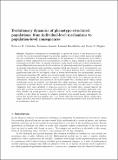Files in this item
Evolutionary dynamics of phenotype-structured populations : from individual-level mechanisms to population-level consequences
Item metadata
| dc.contributor.author | Chisholm, Rebecca H. | |
| dc.contributor.author | Lorenzi, Tommaso | |
| dc.contributor.author | Desvillettes, Laurent | |
| dc.contributor.author | Hughes, Barry D. | |
| dc.date.accessioned | 2017-07-30T23:34:12Z | |
| dc.date.available | 2017-07-30T23:34:12Z | |
| dc.date.issued | 2016-08 | |
| dc.identifier | 244178537 | |
| dc.identifier | c355fa68-6fe5-4dbe-b18c-0ff6e7c26607 | |
| dc.identifier | 84981275158 | |
| dc.identifier | 000381410100022 | |
| dc.identifier.citation | Chisholm , R H , Lorenzi , T , Desvillettes , L & Hughes , B D 2016 , ' Evolutionary dynamics of phenotype-structured populations : from individual-level mechanisms to population-level consequences ' , Zeitschrift für angewandte Mathematik und Physik , vol. 67 , 100 . https://doi.org/10.1007/s00033-016-0690-7 | en |
| dc.identifier.issn | 0044-2275 | |
| dc.identifier.uri | https://hdl.handle.net/10023/11328 | |
| dc.description | This research was supported in part by the Australian Research Council (DP140100339) and by the French National Research Agency through the ANR blanche project Kibord [ANR-13-BS01-0004] and the “ANR JC” project Modevol [ANR-13-JS01-0009]. TL was also supported in part by the Hadamard Mathematics Labex, backed by the Fondation Mathématique Jacques Hadamard, through a grant overseen by the French National Research Agency [ANR-11-LABX-0056-LMH]. LD was also supported in part by Université Sorbonne Paris Cité “Investissements d’Avenir”[ANR-11-IDEX-0005]. | en |
| dc.description.abstract | Epigenetic mechanisms are increasingly recognised as integral to the adaptation of species that face environmental changes. In particular, empirical work has provided important insights into the contribution of epigenetic mechanisms to the persistence of clonal species, from which a number of verbal explanations have emerged that are suited to logical testing by proof-of-concept mathematical models. Here, we present a stochastic agent-based model and a related deterministic integrodifferential equation model for the evolution of a phenotype-structured population composed of asexually-reproducing and competing organisms which are exposed to novel environmental conditions. This setting has relevance to the study of biological systems where colonising asexual populations must survive and rapidly adapt to hostile environments, like pathogenesis, invasion and tumour metastasis. We explore how evolution might proceed when epigenetic variation in gene expression can change the reproductive capacity of individuals within the population in the new environment. Simulations and analyses of our models clarify the conditions under which certain evolutionary paths are possible, and illustrate that whilst epigenetic mechanisms may facilitate adaptation in asexual species faced with environmental change, they can also lead to a type of “epigenetic load” and contribute to extinction. Moreover, our results offer a formal basis for the claim that constant environments favour individuals with low rates of stochastic phenotypic variation. Finally, our model provides a “proof of concept” of the verbal hypothesis that phenotypic stability is a key driver in rescuing the adaptive potential of an asexual lineage, and supports the notion that intense selection pressure can, to an extent, offset the deleterious effects of high phenotypic instability and biased epimutations, and steer an asexual population back from the brink of an evolutionary dead end. | |
| dc.format.extent | 34 | |
| dc.format.extent | 1951023 | |
| dc.language.iso | eng | |
| dc.relation.ispartof | Zeitschrift für angewandte Mathematik und Physik | en |
| dc.subject | Phenotypic adaptation | en |
| dc.subject | Epimutations | en |
| dc.subject | Agent-based modelling | en |
| dc.subject | Integrodifferential equations | en |
| dc.subject | QA Mathematics | en |
| dc.subject | QC Physics | en |
| dc.subject | NDAS | en |
| dc.subject.lcc | QA | en |
| dc.subject.lcc | QC | en |
| dc.title | Evolutionary dynamics of phenotype-structured populations : from individual-level mechanisms to population-level consequences | en |
| dc.type | Journal article | en |
| dc.contributor.institution | University of St Andrews. Applied Mathematics | en |
| dc.identifier.doi | 10.1007/s00033-016-0690-7 | |
| dc.description.status | Peer reviewed | en |
| dc.date.embargoedUntil | 2017-07-30 |
This item appears in the following Collection(s)
Items in the St Andrews Research Repository are protected by copyright, with all rights reserved, unless otherwise indicated.

